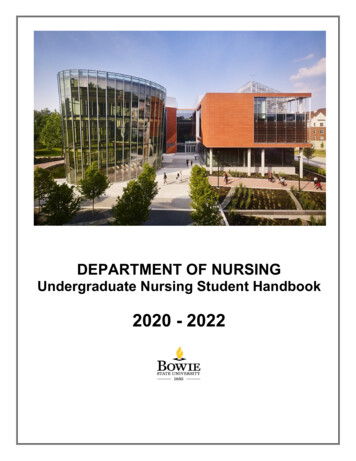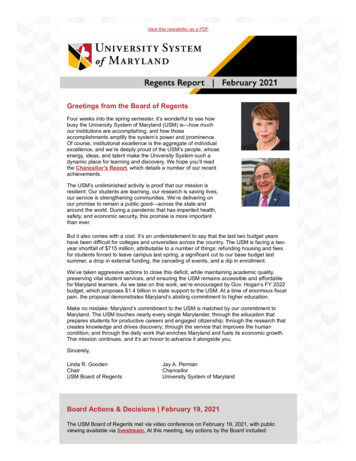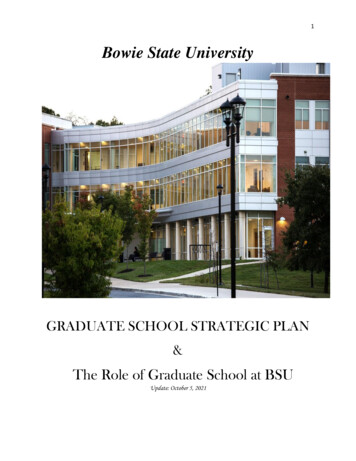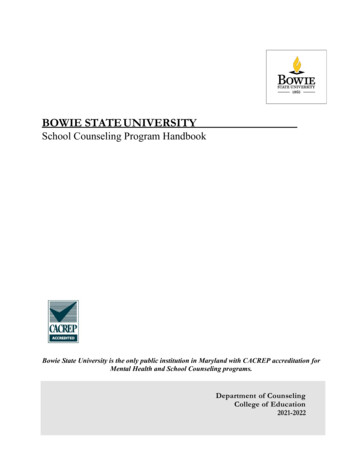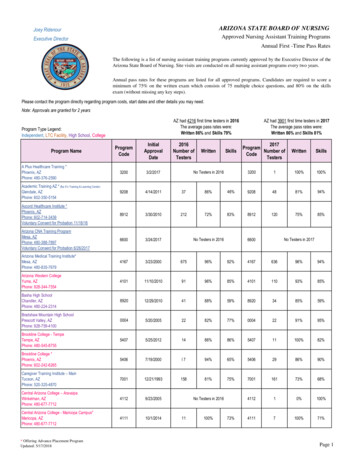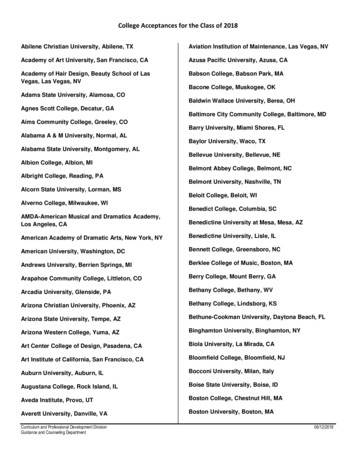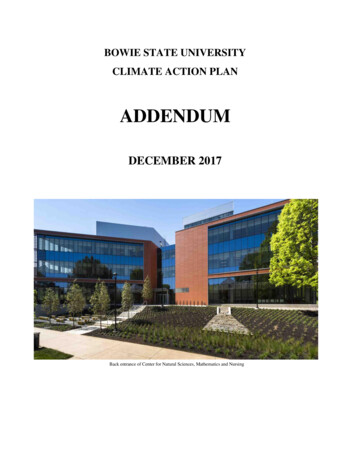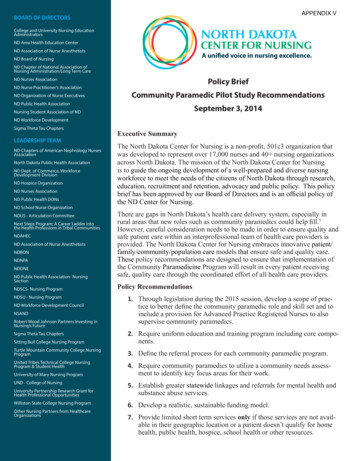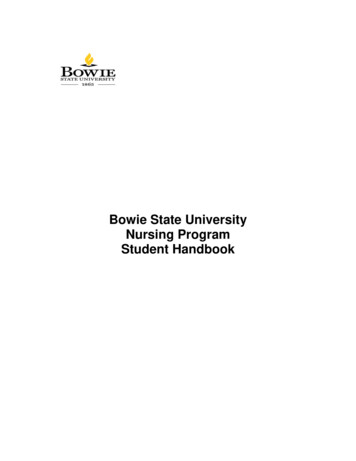
Transcription
Bowie State UniversityNursing ProgramStudent Handbook
Bowie State University Nursing Program Student HandbookTable of ContentsPurpose of Handbook . 3Greetings from the Chair . 4Vision . 5Mission . 5Philosophy . 5Goals . 6Conceptual Framework for the Undergraduate Program . 6Undergraduate Curriculum Program Student Learning Outcomes . 7Undergraduate Curriculum Level Concepts . 8Undergraduate Nursing Student Policies . 10Admission Policies . 10BSU ADMISSION . 11BOWIE STATE UNIVERSITY SOPHOMORE STUDENT (TRADITIONAL PROGRAM) . 11TRANSFER STUDENT (TRADITIONAL PROGRAM) . 12SECOND DEGREE STUDENT (ACCELERATED PROGRAM). 12REGISTERED NURSE (RN TO BS PROGRAM) . 13Nursing Progression Plans . 14Nursing Progression Plans . 15General Policies . 16Course Policies . 18Progression Policies . 19Clinical Policies . 22Helpful Websites . 29Department of Nursing Directory. 30Department Address . 30Department Website. 30Disclaimer .32(Revised August 2017)2
Bowie State University Nursing Program Student HandbookPurpose of HandbookThe Faculty of the Department of Nursing is pleased to have you as a student of this Department.You have chosen a major in a discipline that is demanding and exacting. For the remainder ofthe time that you are in the nursing program, you will be learning to care for clients who will bedependent upon you to exercise good judgment and be accountable for your actions at all times.For this reason, this Handbook has been prepared for you and is to be used to assist you inadapting to the professional nursing student role. It contains information about regulations thatare prerequisites to and requisites for success in the nursing program.This information is to be used as a supplement to the University Catalog.Revisions Published by Bowie State University, Department of Nursing, 2016.Bowie State University is an Equal Educational and Employment Opportunity Institution.The provisions in this Nursing Student Handbook do not constitute a contract between a studentand the Department of Nursing. The nursing faculty, through appropriate University procedures,reserves the right to revise any provision or policy at any time within the student’s term ofenrollment, if deemed advisable. Advance notice of any changes will be given whenever possible.(Revised August 2017)3
Bowie State University Nursing Program Student HandbookGreetings from the ChairWelcome to the Department of Nursing at Bowie State University. We take great pride in yourselection of professional nursing as your career choice.This nursing program will present you with many challenges. You will learn how to overcomethose challenges to become the professional you want to be. Overcoming the challenges will bedone through your fortitude, persistence, inquiry, and preparation for each class day. Your goal isto remain focused on your desired outcome, and your successful completion of the NCLEX-RNexamination on the 1st attempt to enable you to join the nursing profession as a registered nurse.The Department of Nursing has established purposes and goals that direct and guide us toachieve positive outcomes that benefit students, faculty, and the community. The Department ofNursing has the responsibility for educating its students to be responsible practitioners, life-longlearners, inquisitive users of medical and nursing science, and practitioners of evidence-basedknowledge. The faculty in the Department of Nursing is vested in preparing future nurses who: 1)can work within the diverse segments of nursing; 2) understand the nature of cultural diversity; 3)can work with diverse populations, and 4) use evidence-based practice to advance clinicalreasoning.The Department of Nursing offers a Bachelor of Science degree in Nursing (BS). TheDepartment also offers a RN-BS track for registered nurses prepared in diploma or Associatedegree nursing programs who desire to earn a BS in nursing. Individuals who have a degree inother disciplines and or approved transfer credits may be eligible for admission to the Accelerated2nd Degree Program in the Department of Nursing. For nurses seeking a Master’s Degree inNursing, the Department offers the Masters of Science in Nursing (MSN) degree. This trackfocuses on Family Nurse Practitioner and Nurse Educator preparation. Nurses with a Masters inNursing (MSN) may be eligible for admission to earn the Certificate for Advanced Studies (CAS).The Certificate Program’s focus areas include the Family Nurse Practitioner and the NurseEducator.The Department of Nursing is currently accredited by the Accreditation Commission for Educationin Nursing (ACEN).Again, I welcome you to the Department of Nursing. This will be an enriching experience for youand for the faculty of the Department.With warm regards,Rena Boss-Victoria, DrPH, MPH, MS, BSN, RN, CNS, APRNChair and Associate ProfessorDepartment of NursingCollege of Professional StudiesBowie State UniversityBowie, Maryland(Revised August 2017)4
Bowie State University Nursing Program Student HandbookVisionThe Department of Nursing will promote a pathway to academic excellence to address theevolving global health care environment with special emphasis on: DiversityEvidence based practiceTechnologyPractice innovationMissionThe mission is to provide quality academic programs offering learners the opportunity to expandtheir knowledge base and pursue advanced study. The nursing curricula prepare professionalnurses who demonstrate excellence in using new methods in evidence based practice, thinkcritically, apply ethical principles and clinical reasoning, demonstrate leadership skills, valuediversity, and participate or conduct research which benefits the global community. TheDepartment of Nursing is committed to increasing diverse representation in the nursingprofession.PhilosophyNursing curricula are developed and implemented based on the faculty’s beliefs aboutprofessional nursing education and professional nursing practice, the nature of the client, health,and the environment. In order to meet the current and future needs of global communities,professional nursing education must prepare graduates to provide therapeutic and culturallycongruent care in a variety of settings. Professional nursing education encourages thedevelopment of caring behaviors, therapeutic communication, cultural competence, socialawareness and collaborative skills that facilitate academic and personal development. The facultybelieves professional nursing education prepares learners to think critically, to apply clinicalreasoning, to adapt to technological changes, and to pursue continued education as a goaldirected lifelong process.Professional nursing practice is dynamic, complex, and integral to the health care system.Through evidence-based practice, nurses use research findings to make clinical decisions thatfacilitate health promotion, disease prevention, and health restoration to clients across thelifespan. The demonstration of caring behaviors, therapeutic communication, and culturallycongruent care are vital in the provision of client-centered care. Professional nursing practiceadheres to an established framework of ethical principles, legal regulations, and standards ofpractice in order to provide high quality, safe and competent care.The professional nursing role utilizes the nursing process and incorporates research activities,health policies, information technology and clinical leadership in caring for the client. Thus,lifelong education is crucial to professional growth and development.Clients are the consumers of nursing services. They are comprised of individuals, families,groups, and communities. We believe the client is continually responding to the internal andexternal environment, and is capable of achieving optimal health, or a dignified death.Health is a variable state that exists along a continuum of wellness to illness, and is defined bythe client. Health is influenced by a variety of factors such as, spirituality, cultural practices, andenvironmental stimuli. Health outcomes are determined by the client’s ability to cope withenvironmental factors, and to access the health care system.(Revised August 2017)5
Bowie State University Nursing Program Student HandbookEnvironment is the internal and external factors that impact the client’s state of health. Theenvironment influences the client, regardless of whether it is actual or perceived.Undergraduate nursing education is a composition of knowledge in the natural sciences, liberalarts, nursing technology, research, and clinical decision-making. The undergraduate nursingeducational process prepares the learner, as a generalist, to practice holistically in a variety ofsettings within the ethical and legal framework of professional nursing. Graduates are educated tobecome leaders, advocates, and consumers of research, and collaborators as members of thehealth care team. The following concepts are essential to undergraduate nursing education:caring behaviors, communication, culturally congruent care, evidence-based practice,professional nursing roles, and critical thinking.Graduate nursing education builds upon the generalist foundation of undergraduate educationto prepare nurses for advanced practice roles. Graduate education provides the student withopportunities to develop expertise and specialized knowledge in the care of clients andpopulations. The graduate program is organized using core, supporting, and specialty content.Graduate nursing education incorporates evidence-based practice that enables nurses toparticipate in health policy development, research, health promotion, and management, with anemphasis on diverse and vulnerable populations. Advanced practice nursing roles include NursePractitioners, Clinical Nurse Specialists, Nurse Administrators, and Nurse Educators. We believethat advanced practice nursing roles are integral to meeting the current and future health needsof society.Goals1. To provide quality programs supportive of the learning needs of diverse learners so that theymay accomplish their educational goals.2. To provide an environment supportive of quality instruction, the use of technology, scholarlyendeavors, and critical thinking.3. To maintain faculty support systems and staff development programs that foster creativity andfacilitate the faculty's contributions to higher education and the nursing profession.4. To maximize opportunities for students and faculty to participate in the internal operations ofthe University so as to foster optimal communications and ensure maximum involvement inthe development and maintenance of programs and services.5. To engage in cooperative and collaborative relationships with regional communities thatpromote health and nursing.Conceptual Framework for the Undergraduate ProgramThe conceptual framework is an extension of the philosophy and objectives of the Department ofNursing. It provides the design for sequencing the curriculum. The design enables faculty andstudents to comprehend, integrate, and synthesize curriculum content.The curriculum is designed based on two major organizing themes: pervasive and progressive.The pervasive concepts comprising this framework, as it relates to client-centered care, arecaring behaviors, cultural congruency, within an ethical and legal framework. The progressiveconcepts are reflected in the level objectives, and throughout the curriculum. They include criticalthinking, communication, professional nursing role, research and evidence-based practice, andleadership. These progressive concepts indicate the successive levels of skill acquisitionexpected of nursing students as they progress in the program. Each of these organizing themesis defined and elaborated within the level objectives and courses.(Revised August 2017)6
Bowie State University Nursing Program Student HandbookUndergraduate Curriculum Program Student Learning OutcomesUpon completion of the Undergraduate Nursing Program, the graduate will be able to:1. Implement nursing processes and caring behaviors to individuals, families, andcommunities.2. Use communication, technology, and collaborative skills to provide safe and effectivecare.3. Apply culturally congruent care for clients across the life span.4. Utilize evidence-based findings for decision-making that advances sociocultural, political,economic, legal, and ethical issues in nursing.5. Integrate health policies from legislative and governing bodies into nursing practice.6. Employ and lead the development of program policies in collaboration with professionalorganizations to advocate optimal wellness for families and communities.7. Demonstrate accountability for meeting the changing health care needs of diversepopulations representing the global community, through the continuation of personal,professional, and educational development.8. Integrate critical thinking, clinical reasoning to promote optimal wellness to clients,families and communities.(Revised August 2017)7
Bowie State University Nursing Program Student HandbookUndergraduate Curriculum Level ConceptsConcepts123Caring BehaviorsCulturallyCongruent CareEthical and LegalFrameworkFreshman:Level IDefine theConcept ofcaring.Explain thesignificance ofcaringbehaviors innursingpractice.Define cultureand recognizeyour owncultural beliefs,values, andbehaviors.Identify ethicalbehaviors ofthe student.Define termsrelated to thelegal aspects ofnursing.4Critical Thinking(Revised August 2017)Define Criticalthinking and6theSophomoreLevel: IIDemonstratecaringbehaviors intheperformance ofbasic nursingskills.Junior Level:IIIIntegrate caringbehaviors innursinginterventions.Senior Level:IVEvaluate theimpact ofcaringbehaviors onpatientoutcomes.Identify theinfluence ofculture onhealth beliefsand practices.Recognize theimpact ofculture on thenurse-patientrelationship.Appraise theeffectivenessof culturallycongruent careon clientoutcomes.Differentiatehealth beliefsand practicesthat varyamongselectedgroups.Integrateinterventionsthat respect andare consistentwith the culturalbeliefs,behaviors, andtraditions of theclient.Integrate ethicalbehaviors intonursing care.Implementnursinginterventionswithin the legalscope ofpractice, asinterpreted bythe MarylandNurse PracticeAct.Describeethicalstandards thatguide nursingpractice.Describe thepurposes androles of theMarylandgovernment inlegislatingnursingpractice.Demonstrateadherence tothe policiesand standardsof the BSUDepartment ofNursing.Apply criticalthinking skillsin theUtilize criticalthinking skills todetermineDebate theoutcomes ofethicaldilemmas inclient caresituations.Appraisehealth policiesand proposedlaws that effectnursingpractice.Integratecritical thinkingwith8
Bowie State University Nursing Program Student Handbook5ConceptsFreshman:Level Icharacteristicsof a criticalthinker.SophomoreLevel: IIperformance ofbasic nursingassessmentand practices.Junior Level:IIIpriority nursingcare needs forindividuals andfamilies.Senior Level:IVindependentjudgment topromoteoptimalwellness forfamilies andcommunities.CommunicationDemonstratethe essentialcomponents ofbasic oral iontechniques municationskills thatincorporateappropriatestrategies ofcare for clientsacross thelifespan.Appraise theeffects ofcommunicationtechniques onproposedoutcomes.Demonstratebasic clinicaldocumentationskills.6ProfessionalNursing Roles7Research andEvidence-basedPractice(Revised August 2017)Identify the roleand function oftheprofessionalnurse in thehealth caresystem.Explain howtheprofessionalnurse utilizesthe nursingprocess in thenurse-clientrelationship.Describe hownurses ffectivecommunicationsskills withmembers of thehealthcareteam.Demonstrateassimilation intothe professionalrole by:participating asa member ofthe nursingteam; andseeking out newlearningexperiences.Examine theresearchprocess.Identifycomponents ofresearchpublications.Assumeaccountabilityfor meeting thechanginghealth careneeds ofdiversepopulationsrepresentingthe globalcommunity,through thecontinuation Utilizeresearchfindings fordecisionmaking andrationale fornursinginterventions.9
Bowie State University Nursing Program Student HandbookConcepts8Freshman:Level ILeadershipSophomoreLevel: IIJunior Level:IIIExplore theleadership rolewithin thecontext ofgroup.Demonstrateaccountabilityand beginningleadershipabilities innursingpractice.Senior Level:IVCritiquecomponents ofresearchstudies.Evaluate as aleader, theconcepts ofpower andempowermentand autonomyand advocacyin managingnursingpractice.Compares andcontrastsleadershipstyles withinthe nursingstructures andhealth caresystems inreference toSociocultural,political,economic,legal, andethicalinfluences.Undergraduate Nursing Student PoliciesThe policies in this section of the handbook are applicable to undergraduate students enrolledin the various nursing program tracks. These policies are consistent with and supplement theprinciple document governing policies and procedures for students. Students are responsible foraccessing and reviewing the documents that govern undergraduate students.Admission PoliciesThe Bowie State University (BSU) Nursing Program allows the following types of admission: Freshman (Traditional Program)Transfer StudentSecond Degree Student (Accelerated Program)Registered Nurse (RN to BS Program)(Revised August 2017)10
Bowie State University Nursing Program Student HandbookBSU ADMISSIONThese admission policies can be found at the following sites: /undergraduate-admissions/ sing/BOWIE STATE UNIVERSITY SOPHOMORE STUDENT (TRADITIONAL PROGRAM)Traditional nursing admission is designed for sophomore status students at Bowie StateUniversity, who have completed the required general education courses to become eligible foradmission to the Traditional Undergraduate Nursing Program. Candidates for this programtrack are admitted for the fall semester only.The length of the Traditional program is at least 4 years, but not more than 5 years. The first yearconsists of Freshman pre-requisites at Bowie State University (BSU). Sophomores may applyduring the Sophomore Spring semester for a Fall admission into the Junior year of the nursingprogram.In order to be considered for this program track, you must meet the following requirements:Requirements:Candidates can apply for admission to this program track during the second semester of theirSophomore year. They must have completed a full Freshman year and a first semester as aSophomore at Bowie University to be considered. Candidates must meet the followingrequirements: Acceptance to Bowie State University (BSU)Cumulative GPA of 2.75 or betterGPA of 3.0 or better in prerequisite sciencesSuccessful completion of the English Proficiency Examination (EPE)Successful completion of the NURS 101 course requirementCompletion of all required Science courses within 5 years of their admission date tothe programNo more than a total of two withdrawals in any pre-requisite course (Withdrawalscannot be within the same course)No failure or grade less than a C in any pre-requisite courseMust have evidence of success as a full-time student (12 or more credits in onesemester)Standardized Examination for Pre-Nursing Basic Knowledge requiredSubmission of an application to the Department of Nursing during the secondsemester of their Sophomore year (See nursing web site for application deadlines).The Department of Nursing will not accept applications until the establishedapplication submission dates.Sealed official transcripts from each institution attended submitted with the nursingapplication as ONE packet (Nursing courses are not transferable to BSU)A personal statement of your goals and objectives (400 words, typed and doublespaced)(Revised August 2017)11
Bowie State University Nursing Program Student HandbookTRANSFER STUDENT (TRADITIONAL PROGRAM)Transfer nursing admission is designed for those transfer students maintaining 35 or less credits.Candidates for the Traditional Program track are admitted for the fall semester only.Pre-Nursing basic knowledge standardized examinations will be required.The length of the Traditional Program is at least 4 years, but no more than 5 years. Typically, thefirst year consists of Freshman pre-requisites at a college other than BSU. Transfer students andthose who were not eligible for admission in their Sophomore year may apply during theSophomore Spring semester for a Fall admission into the Junior year of the nursing program.Requirements: Acceptance to Bowie State University (BSU) in a Fall semester.Cumulative GPA of 2.75 or betterGPA of 3.0 or better in prerequisite sciencesSuccessful completion of the English Proficiency Examination (EPE)Successful completion of NURS 101 course requirementCompletion of all required Science courses within 5 years of admission date to theprogramNo more than a total of two withdrawals in any pre-requisite course. (Withdrawals cannotbe within the same course)No failure or grade less than a C in any pre-requisite courseMust have evidence of success as a full-time student (12 or more credits in onesemester)Standardized Examination for Pre-Nursing Basic Knowledge requiredSubmission of an application to the Department of Nursing during the second semester oftheir Sophomore year (see nursing web site for application deadlines). The Departmentof Nursing will not accept applications until the established applicationsubmission dates.Sealed official transcripts from each institution attended submitted with the nursingapplication as ONE packet (Nursing courses are not transferable to BSU)A personal statement of your goals and objectives (400 words, typed and double-spaced)SECOND DEGREE STUDENT (ACCELERATED PROGRAM)Accelerated admission is designed for those transfer applicants maintaining 53 or more transfercredits or for those applicants possessing a prior undergraduate degree.Candidates for this program track are admitted for the summer semester only.Pre-Nursing Basic Knowledge standardized examinations will be required.The length of the Accelerated Program is at least 18 months, but no more than 3 years. Typically,the 18 months consists of a Summer Session, Fall Session, Winter Session, Spring Session,Summer Session and a Fall Session. Candidates should apply during the Spring session beforethe Summer Session during which they seek to begin their studies.Requirements: Graduation from an accredited higher education program with an Associate or Bachelor’sdegreeAcceptance to Bowie State University (BSU)Cumulative GPA of 3.0 or better(Revised August 2017)12
Bowie State University Nursing Program Student Handbook GPA of 3.0 or better in prerequisite science and math coursesCompletion of all required Science courses within 5 years of their admission date to theprogramNo more than a total of two withdrawals in any pre-requisite course. (Withdrawals cannotbe within the same course)No failure or grade less than a C in any pre-requisite courseRegistrar documentation of all transfer credits prior to eligibility for conditional and orgateway criteria admissionSealed official transcripts of each institution attended with the nursing application as ONEpacket (Nursing courses are not transferable to BSU)Must have evidence of success as a full-time student (12 or more credits in onesemester)This program begins in the summer and requires year round study for 18 monthsSubmission of an application to the Department of Nursing in the Spring Semester (Seenursing website for application deadlines and required information for Pre-Nursing BasicKnowledge Standardized Testing)A personal statement of your goals and objectives (400 words, typed and double-spaced)REGISTERED NURSE (RN TO BS PROGRAM)Eligible candidates are admitted to this nursing program track for each fall and spring semester.Candidates are required to follow the RN-BS curriculum progression plan and complete allprerequisite courses to become eligible for transition into the RN-BS core nursing courses. Allprerequisite courses must be successfully completed with a grade of "C" or higher. Uponcompletion of all prerequisite courses and consultation with a Nursing academic advisor,candidates will then be required to submit an application for admission to the program.The length of the RN to BS Program is at 2 years, but no more than 3 years. Typically, the 2years consists of a Junior and Senior year. Candidates should apply during the Spring sessionbefore the Fall Session.Requirements: Graduation from an accredited higher education program with a minimum of an AssociateDegree in NursingAcceptance to Bowie State University BSU)Licensure as a Maryland RNCompletion of all general education courses as required per program of studySuccessful completion of nursing prerequisite courses with a grade of “C” or higherMinimum cumulative GPA of 2.0 on a 4.0 scaleSealed official transcripts of each institution attended with the nursing application as ONEpacket.Three letters of recommendation (a reference from your immediate supervisor and twofrom professional colleagues)Submission of the RN to BS application (See website for application dates and deadlineinformation)Current CPR certificationCurrent Maryland RN licensureA personal statement of your goals and objectives (400 words, typed and double-spaced)A completed physical examination/health history (Form provided in application)Current professional resumeStudent profile sheet (Form provided in application)(Revised August 2017)13
Bowie State University Nursing Program Student HandbookNursing Progression Plans(Revised August 2017)14
Bowie State University Nursing Program Student HandbookNursing Progression Plans(Revised August 2017)15
Bowie State University Nursing Program Student HandbookGeneral PoliciesAcademic Honesty and Dishonesty General Policy Statement.Nursing students are expected to conform to a strict standard of academic honesty. In addition tothe Bowie State University Undergraduate Catalog, academic dishonesty includes exhibitingunethical or illegal behaviors including falsification of documents. Students are required to signthe Academic Honesty and Dishonesty form, which is placed in the student’s academic folder inthe Nursing Department. Students will be recommended for dismissal from the nursing programwhen academic dishonesty is confirmed. The Plagiarism checker is used for all writtenassignments submitted to the Safe Assign or Turnitin instruments. Please refer to the BSUUndergraduate Catalog for additional policies about academic dishonesty.Test-Taking Protocol for the Department of Nursing (Effective December 8, 2016)These “Test-Taking Protocols are to be read to the students assembled at the time of TestTaking. If any of the items below are documented by the proctor, the consequences will beenforced to the fullest extent of the University Plagiarism and Academic Honesty and DishonestyPolicies.1. Students may only bring a pen or pencil into the testing area. All materials passed outwith the tests are collected
Bowie State University Nursing Program Student Handbook (Revised August 2017) 7 . Undergraduate Curriculum Program Student Learning Outcomes . Upon completion of the ndergraduate Nursing Program, the graduate will be able to: U . 1. Implement nursing processes and caring behaviors to individuals, families, and communities. 2.
